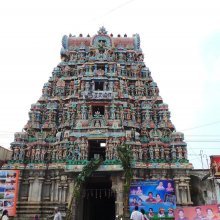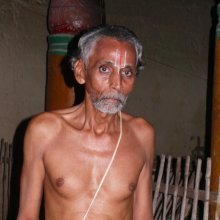Raghunatha, Raghunātha, Raghu-natha: 13 definitions
Introduction:
Raghunatha means something in Hinduism, Sanskrit, the history of ancient India. If you want to know the exact meaning, history, etymology or English translation of this term then check out the descriptions on this page. Add your comment or reference to a book if you want to contribute to this summary article.
Images (photo gallery)
In Hinduism
Shilpashastra (iconography)
Source: archive.org: Pratima Kosa Encyclopedia of Indian Iconography - Vol 6Raghunātha (रघुनाथ) refers to one of the many varieties of the Śālagrāma (ammonite fossil stones).—The Raghunātha has two openings and four cakras, mark of cow’s hoof mark; line suggesting abow. Śālagrāma stones are very ancient geological specimens, rendered rounded and smooth by water-currents in a great length of time. They (e.g., Raghunātha stones) are distinguished by the ammonite (śālā, described as “vajra-kīṭa”, “adamantine worms”) which having entered into them for residence, are fossilized in course of time, leaving discus-like marks inside the stone.

Shilpashastra (शिल्पशास्त्र, śilpaśāstra) represents the ancient Indian science (shastra) of creative arts (shilpa) such as sculpture, iconography and painting. Closely related to Vastushastra (architecture), they often share the same literature.
Chandas (prosody, study of Sanskrit metres)
Source: Shodhganga: a concise history of Sanskrit Chanda literature1) Raghunātha (रघुनाथ) or Raghunātha Dāsa (C. 1680-1750 C.E), author of Vṛttāvalī, a celebrated author of Oḍiśā, composed many work in different disciplines of Sanskrit Literature. He was the son of Vāsudeva and Ambikā. He was the grandson of Śrīnivāsa, great grandson of Narasiṃha and great great grandson of Siddheśvara. He was also the father of Jayadeva and Pītāmbara and grandfather of Nārāyaṇa and Sadāśiva for whom he composed the Amarakośaṭīkā. He belonged to Kauṇḍinyagotra. He was a devotee of God Narasiṃha, whom he praised in the invocatory verse of most of his works. He was a resident of Gaḍagaḍā village, situated on the northern bank of river Prācī in the Sāilo circle (viṣaya) of the Oḍra country (now Oḍiśā). His village falls in the estate of Cakradhara, a Zamindar , who had his headquarter in the fort of Gaṅgeśvara.
2) Raghunātha (रघुनाथ) or Raghunātha Paṇḍita Manohara (1697 C.E.) alias Rāghava, son of Bhikkam Bhaṭṭa and grandson of Śrīkṛṣṇa Bhaṭṭa of Manohara family composed two texts on metrics namely 1. Chandoratnāvalī and 2. Vṛttasiddhāntamañjarī. He was a resident of Kālagiri (=Kolagiri i.e. Coorg), which he afterwards left and became resident of Campāvatīpura, otherwise known as Revadaṇḍā in the Colābā district in Northern Konkana. He mentions about his residence in Cikitsāmañjarī.

Chandas (छन्दस्) refers to Sanskrit prosody and represents one of the six Vedangas (auxiliary disciplines belonging to the study of the Vedas). The science of prosody (chandas-shastra) focusses on the study of the poetic meters such as the commonly known twenty-six metres mentioned by Pingalas.
Nyaya (school of philosophy)
Source: Shodhganga: A study of Nyāya-vaiśeṣika categoriesRaghunātha (रघुनाथ) or Raghunātha Śiromaṇi is regarded as the second great figure of Navya- Nyāya school, whose commentary on Tattvacintāmaṇi is called Dīdhiti. He also wrote a short treatise named Padārthatattvanirūpaṇa. Two other famous writers, viz. Mathurānātha Tarkavāgīśa and Jagadīśa Bhattācārya commented on Raghunātha Śiromaṇi’s commentary. These are Tattvacintāmaṇidīdhitirahasya and Śabdaśaktiprakāśikā. The former belonged to the end of the 16th century A.D. and the later to the beginning of the 17th century A.D.

Nyaya (न्याय, nyaya) refers to a school of Hindu philosophy (astika), drawing its subject-matter from the Upanishads. The Nyaya philosophy is known for its theories on logic, methodology and epistemology, however, it is closely related with Vaisheshika in terms of metaphysics.
Ayurveda (science of life)
Dietetics and Culinary Art (such as household cooking)
Source: Shodhganga: Dietetics and culinary art in ancient and medieval IndiaRaghunātha (रघुनाथ) is the author of the 17th-century Bhojanakutūhala, a Sanskrit book dealing with the topics of dietetics and culinary art, also known as Pākaśāstra or Pākakalā.—Raghunātha Gaṇeśa Navahasta, a Marathi Brāhmin is considered to be the author of Bhojanakutūhala. He is also known by the name Raghunāthasūrin. He was one among the court members of Ekoji the Maratha king of Tanjavur. His father was Gaṇeśabhaṭṭa.
Raghunātha has lived in between 1640-1710 CE. He was the pupil of Anantadeva, the author of Smṛtikaustubha and other works on Dharmaśāstra. He has to his credit many works written both in Sanskrit and Marathi languages. According to K.S.Mahadeva Sastri, Raghunātha gives a list of all his earlier works in his Marathi work Narakavarṇana.

Āyurveda (आयुर्वेद, ayurveda) is a branch of Indian science dealing with medicine, herbalism, taxology, anatomy, surgery, alchemy and related topics. Traditional practice of Āyurveda in ancient India dates back to at least the first millenium BC. Literature is commonly written in Sanskrit using various poetic metres.
India history and geography
Source: Shodhganga: a concise history of Sanskrit Chanda literature (history)Raghunātha (रघुनाथ) or Raghunātha Upādhyāya was the son of Gokunātha Upādhyāya (C. 1650-1740 C.E.): the author of Ekāvalī and Vṛttataraṅgiṇī. Gokulanātha was the son of Pītāmbara Upādhyāya and Umā and grandson of Rāmabhadra. He was the younger brother of Trilocana and Dhanañjaya and elder brother of Jagaddhara. He was also the father of Raghunātha Upādhyāya. He lost his only daughter Kādambarī, who was drowned in the river Gaṅgā, when she was a child. Gokulanātha composed a poem namely Kuṇḍakādambarī in her memory.

The history of India traces the identification of countries, villages, towns and other regions of India, as well as mythology, zoology, royal dynasties, rulers, tribes, local festivities and traditions and regional languages. Ancient India enjoyed religious freedom and encourages the path of Dharma, a concept common to Buddhism, Hinduism, and Jainism.
Languages of India and abroad
Sanskrit dictionary
Source: Cologne Digital Sanskrit Dictionaries: Shabda-Sagara Sanskrit-English DictionaryRaghunātha (रघुनाथ).—m.
(-thaḥ) A name of Rama. E. raghu the race of Raghu, nātha lord.
Source: Cologne Digital Sanskrit Dictionaries: Benfey Sanskrit-English DictionaryRaghunātha (रघुनाथ).—m. Rāma.
Raghunātha is a Sanskrit compound consisting of the terms raghu and nātha (नाथ).
Source: Cologne Digital Sanskrit Dictionaries: Cappeller Sanskrit-English DictionaryRaghunātha (रघुनाथ).—raghunāyaka & raghupati the chief of the Raghus, i.e. Rāma.
Source: Cologne Digital Sanskrit Dictionaries: Aufrecht Catalogus Catalogorum1) Raghunātha (रघुनाथ) as mentioned in Aufrecht’s Catalogus Catalogorum:—father of Narasiṃha (Advaitacandrikā). Hall. p. 158.
2) Raghunātha (रघुनाथ):—father of Rāmabhadra (Mugdhabodhaṭīkā). Io. 226.
3) Raghunātha (रघुनाथ):—poet. Padyāvalī.
4) Raghunātha (रघुनाथ):—Āgrayaṇeṣṭiprayoga.
5) Raghunātha (रघुनाथ):—Ādhānapaddhati. Darśaśrāddhapaddhati. Śrāddhapaddhati.
6) Raghunātha (रघुनाथ):—Āśaucanirṇaya. Tithinirṇaya. Vyatiṣaṅganirṇaya.
7) Raghunātha (रघुनाथ):—
—[commentary] on Keśvārka’s Jātakapaddhati.
8) Raghunātha (रघुनाथ):—Khaṇḍanabhūṣāmaṇi, vedānta.
9) Raghunātha (रघुनाथ):—nephew of Nārāyaṇa: Khaṇḍapraśastiṭīkā.
10) Raghunātha (रघुनाथ):—Kheṭataraṅgiṇī jy.
11) Raghunātha (रघुनाथ):—Gayākṛtya or Gayānuṣṭhānapaddhati or Gayāpaddhati.
12) Raghunātha (रघुनाथ):—Jātiviveka.
13) Raghunātha (रघुनाथ):—Jyotirnirṇaya.
14) Raghunātha (रघुनाथ):—Tryambakīṭīkā [dharma]
15) Raghunātha (रघुनाथ):—Dravyaśuddhi [dharma]
16) Raghunātha (रघुनाथ):—Dharmasetu.
17) Raghunātha (रघुनाथ):—Nāmacandrikā. See also Puruṣottamasahasranāman.
18) Raghunātha (रघुनाथ):—Pūrtamālā.
19) Raghunātha (रघुनाथ):—Prāyaścittakutūhala.
20) Raghunātha (रघुनाथ):—Brahmabodha and Brahmāvabodha.
21) Raghunātha (रघुनाथ):—Bhaktimīmāṃsāsūtra (?). Bhaktisaṃnyāsanirṇayavivaraṇa.
22) Raghunātha (रघुनाथ):—Bharataśāstra alaṃk.
23) Raghunātha (रघुनाथ):—Bhāvaratnasamuccaya jy.
24) Raghunātha (रघुनाथ):—Muhūrtaratna jy.
25) Raghunātha (रघुनाथ):—Yatidharmasamuccaya. Yatyantakarmapaddhati.
26) Raghunātha (रघुनाथ):—Vivekadhairyāśraya.
27) Raghunātha (रघुनाथ):—Vaidyavilāsa.
28) Raghunātha (रघुनाथ):—Śāṅkhāyanagṛhyasūtrārthadarpaṇa.
29) Raghunātha (रघुनाथ):—Śrīpatiṭīkā jy.
30) Raghunātha (रघुनाथ):—Sarasvatīsūtralaghubhāṣya [grammatical]
31) Raghunātha (रघुनाथ):—Perhaps the same as the following: Sukhabodha jy.
32) Raghunātha (रघुनाथ):—Subodhamañjarī jy.
33) Raghunātha (रघुनाथ):—Hillājaṭīkā jy.
34) Raghunātha (रघुनाथ):—son of Anantadeva: Dharmāmṛtamahodadhi.
35) Raghunātha (रघुनाथ):—son of Jayarāma, wrote in 1564: Rasikaramaṇa kāvya.
36) Raghunātha (रघुनाथ):—son of Bhānuji: Prayogatattva.
37) Raghunātha (रघुनाथ):—son of Lakṣmaṇa: Jātakakallola. Bik. 300 (here called Raghunandana), or Kallolajātaka.
38) Raghunātha (रघुनाथ):—son of Lakṣmīdhara, grandson of Govardhana: Maitrāvaruṇaprayoga Śānkh. He lived in 1591. See W. p. 410.
39) Raghunātha (रघुनाथ):—son of Viṭṭhala Dīkṣita: Padya.
40) Raghunātha (रघुनाथ):—of the Cittapāvana family, son of Sarasa: Muhūrtamālā.
41) Raghunātha (रघुनाथ):—the author of Smārtavyavasthārṇava was a son of Mathureśa Tarkapañcānana.
42) Raghunātha (रघुनाथ):—son of Bhānujī, wrote the Prayogatattva in 1656.
43) Raghunātha (रघुनाथ):—Gaṇeśapaddhati.
44) Raghunātha (रघुनाथ):—Jyotirmañjarī.
45) Raghunātha (रघुनाथ):—Nāmaratnākhyastotra. Yamunāṣṭapadīvivaraṇa. Stavana.
46) Raghunātha (रघुनाथ):—Bhaktihaṃsavivṛti.
47) Raghunātha (रघुनाथ):—called also rāghava, of Campāvatī, composed in 1698: Vaidyavilāsa.
48) Raghunātha (रघुनाथ):—Śrīpaddhati [tantric]
49) Raghunātha (रघुनाथ):—son of Viśvāmitra: Kārtavīryārjunadīpadānapaddhati.
50) Raghunātha (रघुनाथ):—son of Sarasa: Prākṛtānanda.
51) Raghunātha (रघुनाथ):—q. v.: Vaidyavilāsa.
Raghunātha has the following synonyms: Rāghava.
52) Raghunātha (रघुनाथ):—Grahakalpataruvyākhyā.
53) Raghunātha (रघुनाथ):—Bhagavadarcanavidhi.
54) Raghunātha (रघुनाथ):—Siddhāntarahasya, bhakti.
55) Raghunātha (रघुनाथ):—Ārādhanāstotra. Giridhāryaṣṭaka. Gokulāṣṭaka. Nāmaratnastotra. Puṣṭipravāhamaryādāvivecanavivaraṇa. Bhaktihetunirṇayaṭīkā. Vallabhāṣṭakaṭīkā. C. on Viṭṭhaleśvara’s Sarvottamastotra.
56) Raghunātha (रघुनाथ):—Jayābhiṣekaprayoga.
57) Raghunātha (रघुनाथ):—Tantradarpaṇa.
58) Raghunātha (रघुनाथ):—Vṛṣādristotra.
59) Raghunātha (रघुनाथ):—C. on the Sarasvatīsūtra.
60) Raghunātha (रघुनाथ):—son of Mādhava: Gayāśrāddhapaddhati. Daśaślokī. Rājyābhiṣekapaddhati.
61) Raghunātha (रघुनाथ):—son of Viṭṭhaladīkṣita, grandson of Vallabhadīkṣita: Puruṣottamasahasranāmaṭīkā Nāmacandrikā.
62) Raghunātha (रघुनाथ):—son of Śivarāma: Sāṃkhyatattvavicāra.
Source: Cologne Digital Sanskrit Dictionaries: Monier-Williams Sanskrit-English Dictionary1) Raghunātha (रघुनाथ):—[=raghu-nātha] [from raghu] m. ‘lord of the Raghus’, Name of Rāma, [Raghuvaṃśa]
2) [v.s. ...] Name of various authors and others (also with dīkṣita, bhaṭṭa, ārya, ācārya, upādhyāya, kavi, yati, yatīndra, paṇḍita, sūri, cakravartin, bhūpāla etc.), [Inscriptions; Catalogue(s)]
Source: Cologne Digital Sanskrit Dictionaries: Yates Sanskrit-English DictionaryRaghunātha (रघुनाथ):—[raghu-nātha] (thaḥ) 1. m. Idem.
[Sanskrit to German]
Sanskrit, also spelled संस्कृतम् (saṃskṛtam), is an ancient language of India commonly seen as the grandmother of the Indo-European language family (even English!). Closely allied with Prakrit and Pali, Sanskrit is more exhaustive in both grammar and terms and has the most extensive collection of literature in the world, greatly surpassing its sister-languages Greek and Latin.
See also (Relevant definitions)
Partial matches: Raghu, Natha.
Starts with (+26): Raghunatha acarya, Raghunatha bhaskara, Raghunatha bhatta, Raghunatha bhupala, Raghunatha cakravartin, Raghunatha dikshita, Raghunatha dokshita, Raghunatha gosvamin, Raghunatha kavi, Raghunatha maskarin, Raghunatha mishra, Raghunatha pandita, Raghunatha samratsthapati, Raghunatha sarasvati, Raghunatha sarvabhauma bhattacarya, Raghunatha sharman, Raghunatha shastrin parvatikara, Raghunatha shiromani, Raghunatha suri, Raghunatha tarkavagisha.
Ends with: Dhundho raghunatha, Yajnika raghunatha.
Full-text (+397): Siddhantarnava, Shabdavadartha, Tarkikacudamani, Rajakoshanighantu, Mahopadhyaya, Raghunathacarita, Raghunathanathabhyudaya, Raghunathavilasa, Raghunathapancaratna, Raghunathavratakatha, Raghunathabhupaliya, Raghunathabhattagosvamigunaleshashtaka, Prayashcittakutuhala, Bhattacaryashiromani, Dharmamritamahodadhi, Rayaraghava, Rajavyavaharakosha, Bharatashastra, Raghunatha bhatta, Raghunatha yati.
Relevant text
Search found 40 books and stories containing Raghunatha, Raghunātha, Raghu-natha, Raghu-nātha; (plurals include: Raghunathas, Raghunāthas, nathas, nāthas). You can also click to the full overview containing English textual excerpts. Below are direct links for the most relevant articles:
Brihad Bhagavatamrita (commentary) (by Śrī Śrīmad Bhaktivedānta Nārāyana Gosvāmī Mahārāja)
Verse 2.1.63 < [Chapter 1 - Vairāgya (renunciation)]
Verse 2.4.254 < [Chapter 4 - Vaikuṇṭha (the spiritual world)]
Verse 2.4.243 < [Chapter 4 - Vaikuṇṭha (the spiritual world)]
Later Chola Temples (by S. R. Balasubrahmanyam)
Temples in Pattisvaram (Palayarai-Malapadi) < [Chapter X - Temples of Rajadhjraja II’s Time]
Nyaya-Vaisheshika categories (Study) (by Diptimani Goswami)
Date of Annaṃbhaṭṭa < [Chapter 1 - Introduction]
The Navya-Nyāya System < [Chapter 1 - Introduction]
Nature of Abhāva < [Chapter 7 - Abhāva (Non-existence)]
The Padma Purana (by N.A. Deshpande)
Chapter 3 - Rāma Enters Ayodhyā < [Section 5 - Pātāla-Khaṇḍa (Section on the Nether World)]
Chapter 32 - Satyavān Meets Śatrughna < [Section 5 - Pātāla-Khaṇḍa (Section on the Nether World)]
Chapter 38 - Getting Back the Horse from the Possession of an Under-Water Female < [Section 5 - Pātāla-Khaṇḍa (Section on the Nether World)]
Kanakabhisheka to the Sage of Kanchi < [April – June, 1993]
Reviews < [April 1964]
Book Reviews < [January – March, 1993]
Srila Gurudeva (The Supreme Treasure) (by Swami Bhaktivedanta Madhava Maharaja)
Receiving all Moods from Śrī Guru < [Chapter 2.12 - Early ISKCON Conversations with Śrīla Gurudeva]
Significance of the Tulasī plant < [Chapter 2.12 - Early ISKCON Conversations with Śrīla Gurudeva]
Remembering Kṛṣṇa’s pastimes and serving in separation < [Chapter 2.12 - Early ISKCON Conversations with Śrīla Gurudeva]
Related products


